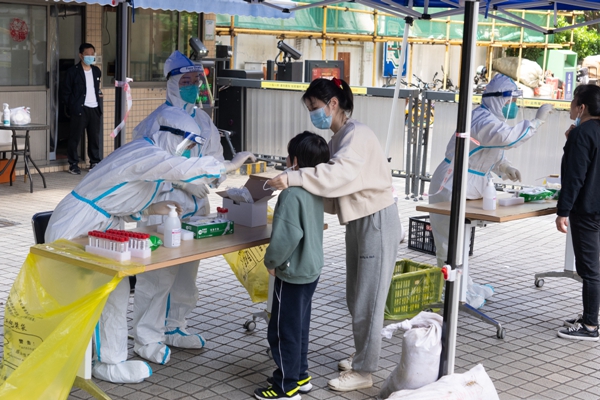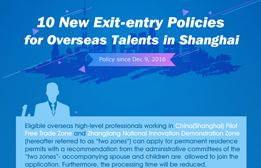Foreign doctors join frontline workers out of love for Shanghai

Residents take nucleic acid tests in a community in Changning district in East China's Shanghai on April 2. [Photo by Gao Erqiang/chinadaily.com.cn]
When they put on protective clothing and speak Mandarin at the nucleic acid testing sites in Shanghai, foreign doctors from Shanghai Punan Hospital are no different from "big white" Chinese angels.
Many of the doctors have worked in Shanghai for more than 10 years and some have got married and settled down in the city. They are working together with their Chinese colleagues on the frontline to battle Shanghai's latest COVID-19 outbreak.
Himiko Ono, a Japanese doctor at the hospital who has worked in Shanghai for more than 10 years, said she wants to shoulder the responsibility of being a doctor by helping Shanghai through the current hardships. When the hospital recruited medical workers for nucleic acid sampling, she immediately signed up.
"I've been hearing people say 'thank you doctor' for the past few days. Although the work is very hard, I was very moved when I heard these warm words while working."
She once received exquisite snacks made by local residents, which made her very happy. Although she did not accept them due to the requirements of epidemic prevention, she took photos of the nice gestures for her personal memories.
After finishing her shift one day, Ono and her colleagues took the bus back to the hospital in cold and rainy weather. She saw a young nurse looking out the window and was secretly weeping. "Looking at her red eyes, I could feel her mood. Maybe she was too tired and wanted to go home to see her parents," Ono recalled. She said that after living in the hospital for six weeks, the woman's tears made her miss her own two children.
"I hope Shanghai can return to normal as soon as possible. I believe that after the epidemic is over, people will unite and Shanghai will become a better city," Ono said.
Makoto Terasaki, a Japanese doctor who has worked on the front lines of clinical treatment for the past two years, has not returned to his home country during that period. There was an outbreak in Shanghai after the breakout in Wuhan in 2020, and he returned back to China after only one day in Japan. Later, the outbreak in Shanghai was soon brought under control, and he continued to work throughout the ordeal.
Since the recent COVID-19 outbreak, Terasaki has participated in seven community nucleic acid sampling events. "I want to do my part to make Shanghai, the city I love, return to normal as soon as possible, and I hope that the global pandemic will dissipate as soon as possible."
Last August, Terasaki's daughter was born in Shanghai. He said that after everything is back to normal, the first thing he wants to do is to go home and show his mother her granddaughter.
Yong-Jin Park, a doctor from South Korea, joined the community sampling team on March 12 and has served seven locations. He lives with his Chinese wife in Shanghai.
When there was a sampling task, he would start preparations at 5 am in the morning and take the bus to various communities to carry out nucleic acid tests. In the beginning, he often had to work into the evening or even into the early morning. "Although the work is exhausting, sometimes I am very touched by the love and support I receive from the residents."
Just a few days ago, he accidentally hurt his back, but insisted on working through the pain. His colleagues found him to be uncomfortable. "Some colleagues brought me lumbar supports from their homes, and some took the initiative to help me carry things and take care of me during work, which I'm very thankful for."
Like Terasaki, Park has not returned to his hometown for two years. In 2020, when he went to Shanghai from South Korea, his family and friends advised him not to go because they don't know when he can come back. "As a doctor, I definitely have to go back to Shanghai, this is my mission," he said.
Park once received a task to perform nucleic acid tests on patients who tested positive or who were in close contact with infected individuals on a very cold and rainy day. "The volunteers who drove us to the sampling site bought dumplings for us at their own expense," he recalled. Park said that after finishing his work at 2 am, he felt that the dumplings in his hands were more fragrant than those from buffets.
"Recently, whether it is doctors, nurses or logistics staff, everyone has been working very hard and the workload is very heavy," Park said. "In fact, whether it is medical staff member who conducts nucleic acid tests for residents, or residents who are quarantined at home, they are all faced with difficulties, but I believe that as long as we all work hard, we will definitely be able to get through this difficult time."

 Print
Print Mail
Mail




